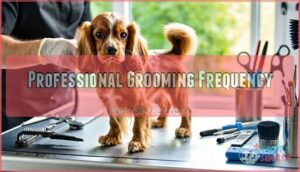This site is supported by our readers. We may earn a commission, at no cost to you, if you purchase through links.

These pups grow fast, hit twelve pounds by ten weeks, and love people fiercely—sometimes so much they’ll shadow you like a four-legged shadow.
Be ready for daily grooming to dodge mats, and early training works wonders on their sharp minds.
Health-wise, ears and hips need regular checks; annual care easily tops $1,000.
Whether you’re team Working or Show, each brings a personality as vibrant as a morning walk—just wait until you hear about their favorite games.
Table Of Contents
- Key Takeaways
- Key Facts About Cocker Spaniel Puppies
- Temperament and Family Compatibility
- Essential Health and Genetic Considerations
- Grooming Needs and Coat Maintenance
- Training Tips for Cocker Spaniel Puppies
- Exercise and Mental Stimulation Requirements
- Preparing for Adoption and Responsible Ownership
- Frequently Asked Questions (FAQs)
- What to consider before getting a cocker spaniel?
- How difficult are cocker spaniel puppies?
- How do I stop my cocker spaniel from peeing in the house?
- Which cocker spaniel is the calmest?
- How do Cocker Spaniel puppies interact with other animals?
- Are Cocker Spaniels suitable for allergy sufferers?
- What travel considerations apply for Cocker Spaniel puppies?
- How do Cocker Spaniels handle extreme weather conditions?
- Conclusion
Key Takeaways
- Be ready for daily grooming—Cocker Spaniel puppies have dense coats that tangle easily and need regular brushing and professional care.
- These pups crave companionship; they get attached fast and don’t do well left alone for long.
- Early training and socialization are crucial—Cocker Spaniels are bright, eager to please, and respond well to positive reinforcement.
- Regular health checks are non-negotiable, since this breed’s prone to ear infections, hip issues, and certain genetic conditions.
Key Facts About Cocker Spaniel Puppies
You’ll notice Cocker Spaniel puppies grow quickly, starting out tiny but soon reaching playful, sturdy proportions.
Their soft coats, friendly energy, and charming personalities mean you’ll be constantly brushing fur off your pants—and falling for their curious antics, with their friendly energy being a key part of their appeal.
Typical Size and Growth Stages
Watching your Cocker Spaniel puppy grow is like flipping through a living size chart.
Those first weeks see rapid gains—birth weights double fast, with Puppy Weight jumping from just a pound to eight to twelve by ten weeks.
Growth rates speed along, but true maturity stages arrive around one year.
Stay tuned for changing cocker spaniel size milestones—each phase brings new discoveries and is part of the puppy’s overall growth.
Physical Characteristics and Coat Development
Think of cocker spaniel puppies as fluffy works in progress.
Their soft single-layer coat shifts to a denser mane by six months, with shedding patterns that change as they grow.
Expect medium cocker spaniel size, with steady muscle development and coats that tangle if ignored.
Early cocker spaniel grooming keeps them stylish, healthy, and ready for couch cuddles.
Understanding training needs is essential for their development and behavior.
Breed Variations—Working Vs. Show Cockers
Spaniel origins go deep—your choice between cocker spaniel types matters! Here’s how Working Traits stack up against Show Differences:
- Working Cockers: energetic hunters, thrive on action.
- Show Cockers: mellower, bred for looks.
- Breed History: split in the 1890s.
- Cocker Spaniel characteristics: working = lean, show = plush.
- Spaniel puppy care needs vary per type.
Temperament and Family Compatibility
You’ll quickly notice just how affectionate and people-focused Cocker Spaniel puppies are, often sticking closer to you than your favorite pair of socks.
A Cocker Spaniel puppy will become your loyal shadow, always eager for cuddles and never far from your side
Their gentle temperament, high intelligence, and adaptability make them reliable companions for all kinds of families, especially those who don’t mind a shadow with floppy ears, due to their affectionate nature.
Personality Traits and Intelligence
A whirlwind of affection, Cocker Spaniel puppies bring you high Intelligence Levels and impressive Trainability, making daily life smoother.
Their cocker spaniel temperament is gentle but alert, blending keen Social Skills with curious spaniel puppy behavior.
You’ll spot early Emotional Maturity and genuine warmth. If you love cocker spaniel facts, their loving nature and willingness to please stand out as key cocker spaniel characteristics.
Behavior With Children and Other Pets
Guided by their gentle cocker spaniel temperament, these pups thrive on positive pet interactions and often become best buddies with kids.
Prioritize child safety by teaching both puppy socialization tips and respectful boundaries.
Early household dynamics training builds strong family bonds.
With consistent puppy training methods, spaniel puppy behavior naturally adapts, making the cocker spaniel breed a favorite for playful, loving homes.
Understanding dog training needs is essential for creating a harmonious household environment.
Separation Anxiety and Attachment Levels
Cocker Spaniel puppies form close bonds and may stick to you like Velcro—leaving them alone too long can kick up serious Separation Phobia.
If your dog’s tail seems glued to your leg, use Bonding Techniques and puppy socialization tips to build confidence.
Early spaniel puppy training and Stress Management help prevent Anxiety Triggers, easing future Attachment Issues.
Essential Health and Genetic Considerations
When you welcome a Cocker Spaniel puppy into your home, you’ll want to know about genetic conditions that could affect their health, like kidney disease and ear infections.
Reliable breeders screen for serious issues, but staying informed (and ready for extra vet visits and the occasional floppy ear clean) sets you up for a healthier, happier pup.
Common Genetic Health Issues
Your puppy’s genetic blueprint carries potential health challenges that responsible owners must understand.
Familial Nephropathy threatens kidney function in young dogs, while Progressive Retinal Atrophy gradually steals vision.
Hip Dysplasia affects joints, and Ear Infections plague this breed’s distinctive floppy ears.
These inherited conditions directly impact cocker spaniel lifespan and require proactive puppy health checks to guarantee your furry friend thrives.
Understanding common Cocker Spaniel issues is vital for providing the best care to ensure your puppy leads a healthy life.
Importance of Health Screenings and Tests
Health screenings protect your future companion from preventable suffering.
Thorough genetic testing reveals carriers and affected dogs before symptoms appear. BAER testing detects deafness, while DNA panels screen for progressive retinal atrophy and familial nephropathy.
Hip evaluations and annual eye exams catch hereditary issues early. These screening methods enable disease prevention through informed veterinary care decisions during puppy adoption.
Regular genetic health assessments help identify potential genetic health issues that can impact a dog’s quality of life.
Lifespan and Veterinary Care Costs
Understanding spaniel breed information means facing reality about Vet Costs and Lifespan Factors early on. English Cockers typically live 12-15 years, while Americans average 10-14 years, with females outliving males by roughly one year.
Annual Expenses to expect:
- Routine care – $225-300 for wellness visits, plus $185 for preventatives, totaling $1,000+ yearly
- Health Tests – Genetic screenings and breed-specific monitoring add significant Medical Insurance value
- Emergency costs – Ear infections ($20-200), eye disorders ($1,500-5,000), making spaniel puppy costs substantial for responsible puppy adoption tips
Grooming Needs and Coat Maintenance
Cocker Spaniel puppies require significant grooming commitment from day one, with their beautiful coats demanding daily brushing to prevent painful mats and tangles.
Even the tiniest spaniel pup needs daily coat care—grooming is a love language for these fluffy companions
You’ll need to budget for professional grooming every 6-8 weeks and master regular ear cleaning to keep your pup healthy and comfortable.
Brushing and Shedding Requirements
Daily brushing isn’t just recommended—it’s essential for coat maintenance and shedding control in Cocker Spaniels.
Their dense, moderately long coats tangle easily without proper care. You’ll need quality brushing tools like slicker brushes and metal combs for effective mat prevention.
Establishing consistent grooming tips early helps your puppy accept handling while maintaining that beautiful spaniel coat everyone admires.
Regular use of a slicker brush tool is vital for preventing matting and tangling in their fur, which is a key part of coat maintenance.
Professional Grooming Frequency
Professional grooming every six to eight weeks keeps your cocker spaniel’s coat healthy and prevents painful matting.
While you can’t skip regular brushing between appointments, professional groomers have specialized tools and expertise for thorough coat maintenance.
- Sharp scissors trimming feathering around legs and ears
- Professional clippers creating even body length cuts
- Specialized dematting tools removing stubborn tangles safely
- High-velocity dryers fluffing coat to full volume
- Thinning shears blending layers for natural appearance
Ear Cleaning and Nail Care
Cocker spaniel grooming extends beyond brushing to include regular ear cleaning and nail trimming.
Their floppy ears trap moisture and debris, making ear infections a common concern that affects up to 20% annually.
Clean ears weekly with veterinarian-approved solutions to prevent issues related to ear infection causes.
Trim nails every 3-4 weeks to prevent painful splaying and maintain proper paw care and nail health for your growing puppy.
Training Tips for Cocker Spaniel Puppies
Training your Cocker Spaniel puppy requires patience and consistency, but these intelligent dogs respond well to positive methods.
You’ll find success with early housebreaking, proper socialization, and reward-based techniques that work with their willing-to-please nature.
Housebreaking and Crate Training
Your cocker spaniel’s beautiful coat needs regular care, but potty training deserves equal attention.
Housebreaking tips start with choosing the right crate size—large enough for comfort but small enough to discourage accidents. Most puppies master puppy training methods within 3-6 months using consistent schedules and positive reinforcement.
Establish puppy boundaries by taking them outside immediately after meals, naps, and playtime.
Effective crate training requires proper use of Crate Training tools to help with housebreaking.
Socialization and Bite Inhibition
After crate training, shift focus to puppy socialization and bite inhibition.
Take your pup to new places, let them meet gentle dogs, and use leash training to keep play controlled.
Soft mouths come from games where you calmly correct nips.
Remember, positive reinforcement—kind words and treats—works best.
These early habits help prevent separation anxiety and encourage healthy eating and spaniel puppy nutrition.
Positive Reinforcement Techniques
Building on early bite inhibition, try Clicker Training and tailor your Reward Systems—tiny treats work wonders for Leash Manners and quick Obedience Commands.
Consistency beats confusion every time, and Treat Motivation is your golden ticket, much like a language model relies on data.
Blend puppy training methods with proper spaniel puppy nutrition and exercise, then watch confidence bloom.
Exercise and Mental Stimulation Requirements
You’ll find that Cocker Spaniel puppies have energy to spare and need daily exercise to stay fit and happy, so don’t be surprised if your living room turns into an agility course.
Providing regular mental challenges, like puzzle toys or training games, helps prevent boredom and keeps their enthusiastic minds out of mischief.
Daily Walks and Playtime
Everyone knows a tired puppy is a happy companion.
Start with twice-daily walks to manage high energy levels, using Leash Training for Outdoor Safety.
Toss in Playtime Activities like fetch—great for satisfying those curious noses and paws.
Adjust Daily Exercises to meet puppy exercise needs and try varied puppy training methods so boredom and bad behavior don’t sneak in, ensuring a happy and happy companion.
Mental Challenges and Enrichment
Once your puppy’s legs are tired, it’s time to work the brain.
Try brain games, scent work, and puzzle toys—these tap into Cocker Spaniel curiosity and meet puppy exercise needs in new ways.
Socialization techniques paired with mental stimulation help strengthen confidence, just like language learning resources benefit language model training or natural language processing for smarter pups.
Preventing Boredom and Destructive Behavior
When left to their own devices, Cocker Spaniel puppies invent mischief—chewing, digging, or barking.
Stop boredom and destructive habits in their tracks by prioritizing Mental Stimulation.
Stick to these three steps:
- Rotate Playtime Activities and toys daily.
- Meet high Exercise Needs with brisk walks.
- Explore Online Resources, like puppy feeding guides and language model training games.
Preparing for Adoption and Responsible Ownership
Before you welcome a Cocker Spaniel puppy home, you’ll need to prepare your space with sturdy gates, chew-proof cords, and a good vacuum for all that puppy fluff.
Responsible ownership starts with choosing a reputable breeder or rescue and making sure you’re ready for regular grooming, daily exercise, and a commitment that might outlast your car, which is a significant commitment.
Finding Ethical Breeders or Rescues
Choosing where you find your new Cocker Spaniel is a bit like picking a reliable online resource for a puppy feeding guide—trust matters.
Focus on reputable breeders who offer health guarantees and transparent records, and use Rescue Screening to sidestep breeder red flags and scams.
:
—:
:
—:
Puppy-Proofing Your Home
After vetting responsible breeders or rescues, shift gears and scout your home for Toxic Hazards.
Stash cords for Electrical Safety, and keep favorite shoes out of reach—Cocker pups love to explore.
Offer Chew Toys as safe distractions. Create clear Safe Zones, using cues like “leave it” (just like English Language dictionary entries define boundaries), to Secure Belongings and encourage healthy habits.
Essential Supplies and Ongoing Commitment
Once your space is safe, it’s time to gather the basics—think strong leashes, beds, food, and enrichment toys.
Plan a supply budget that covers grooming costs and training investment, since both add up quickly.
A quality leash is essential for your Cocker Spaniel’s safety, so consider specialized Cocker Spaniel leashes.
Remember, language education and study matter for you, too—seek out educational resources, language education resources, and reliable guides for long-term care and daily time commitment.
Frequently Asked Questions (FAQs)
What to consider before getting a cocker spaniel?
Every rose has its thorns—Cocker Spaniels need daily grooming for their flowing coats, plenty of exercise, and constant companionship.
If you can handle energetic walks, frequent vet visits, and cleaning those famous floppy ears, you’re golden.
How difficult are cocker spaniel puppies?
Raising a cocker spaniel puppy isn’t exactly a walk in the park—they’re full of energy, can be stubborn about training, and need lots of attention.
But patience, positive reinforcement, and daily routines turn the chaos into joy.
How do I stop my cocker spaniel from peeing in the house?
Catch your pup in the act? Swiftly guide them outside.
Praise every outdoor potty break like it’s Oscar night.
Clean mistakes with enzyme cleaner.
Stick to a schedule—puppies thrive on routine, and you’ll see fewer puddles soon, by following this routine and giving praise.
Which cocker spaniel is the calmest?
If you want a calmer vibe, the Show Cocker Spaniel tops the list.
Compared to Working Cockers, they’re less intense and have a softer pace.
You’ll find they’re much happier cuddling than chasing every squirrel in sight, which makes them a great companion for those who want a calmer pet.
How do Cocker Spaniel puppies interact with other animals?
Introduce your Cocker Spaniel puppy early to other pets—cats, dogs, rabbits, you name it.
With their playful spirit and gentle nature, these pups usually learn the rules quickly, becoming fast friends.
Positive, supervised meet-ups help.
Are Cocker Spaniels suitable for allergy sufferers?
If you’ve got allergies, a Cocker Spaniel won’t do you any favors.
They shed moderately, and their dense, fluffy coats trap dander.
Frequent grooming helps, but you’ll still find fur and sniffles sneaking up on you.
What travel considerations apply for Cocker Spaniel puppies?
Pack snacks, plan potty breaks, and choose a comfy crate—Cocker Spaniel puppies get anxious on long trips, need frequent exercise, and are prone to overheating.
Secure your pup, clean those floppy ears post-adventure, and keep water handy, as they are prone to overheating and need frequent exercise.
How do Cocker Spaniels handle extreme weather conditions?
Cocker Spaniels don’t fare well in extreme heat or cold.
Their thick coats protect against chill, but they overheat fast.
Keep walks short in hot weather, offer shade and water, and limit exposure in freezing conditions.
Conclusion
Worried a cocker spaniel puppy will overwhelm you?
With daily grooming, vigilant health checks, and consistent training, you’ll handle their affectionate energy with ease.
Armed with all you need to know about cocker spaniel puppies before adopting one, you’re well-prepared for those speedy growth spurts, velvety ears, and constant companionship.
Responsible care, backed by evidence and a little patience, guarantees your new pup thrives—and you’ll soon find their loyalty and quirky antics are absolutely worth it.
- https://www.helsinki.fi/en/researchgroups/dogrisk-health-nutrition-epidemiology-and-disease-detection-dogs/research/research-dogrisk
- https://pmc.ncbi.nlm.nih.gov/articles/PMC6826964/
- https://www.vet.cornell.edu/departments-centers-and-institutes/riney-canine-health-center/canine-health-information/progressive-retinal-atrophy
- https://www.ufaw.org.uk/dogs/cocker-spaniel-otitis-externa-and-media
- https://pubmed.ncbi.nlm.nih.gov/18638346/
















